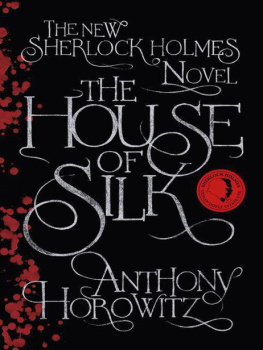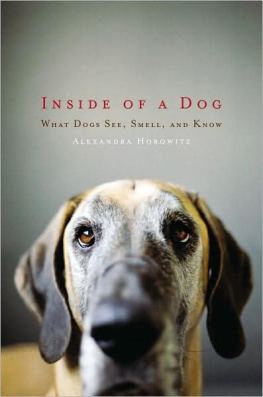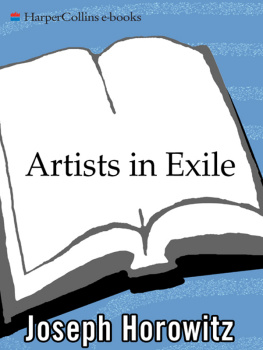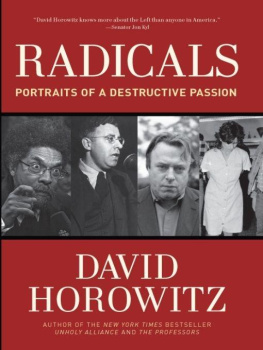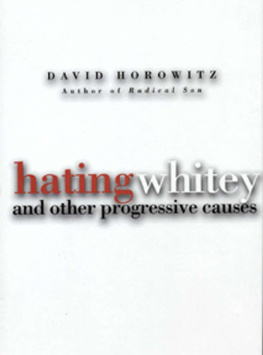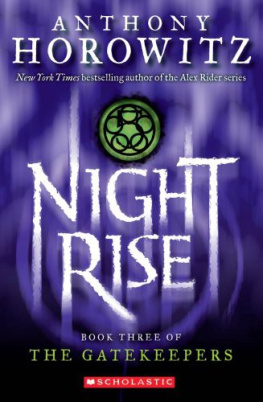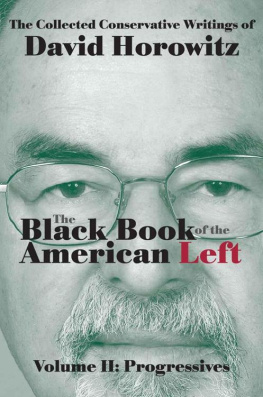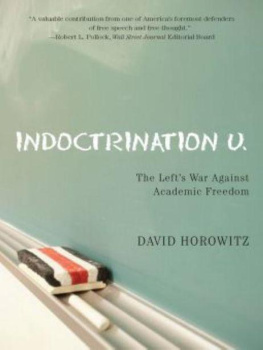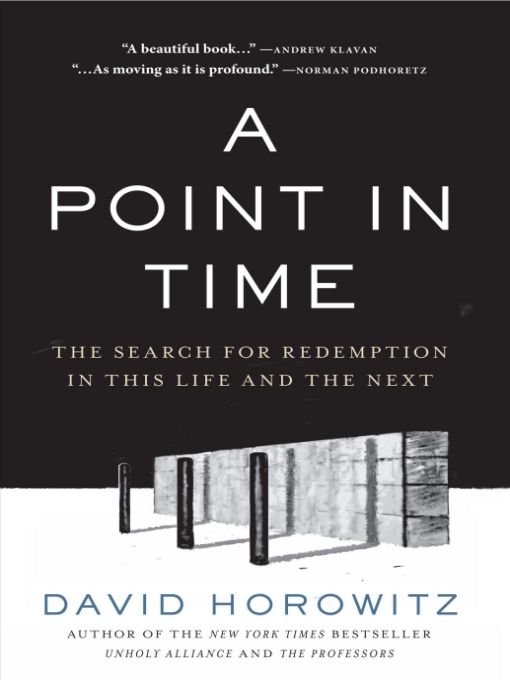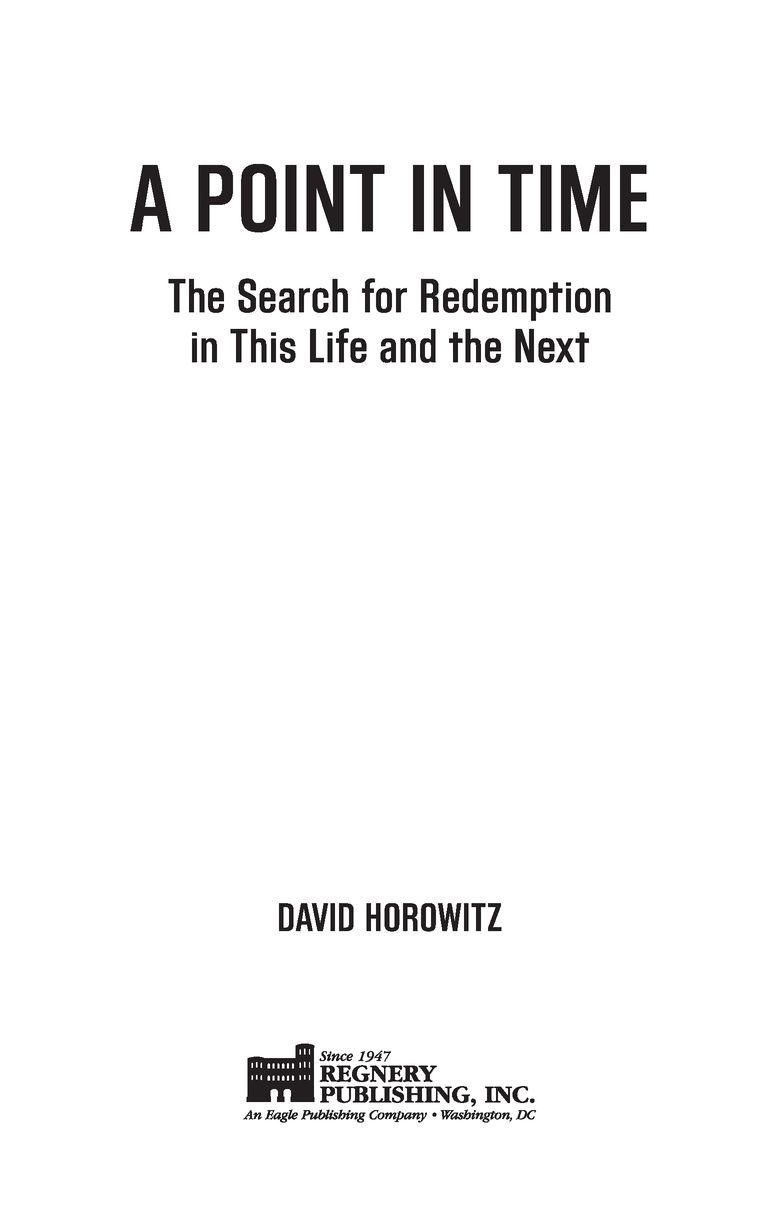Table of Contents
For Sarah
We miss you
Where do we go when we die? he said.
I dont know, the man said. Where are we now?
Cormac McCarthy
PRAISE FOR A POINT IN TIME
David Horowitz is so powerful a polemicist that it is often forgotten how beautifully he writes. For the same reason, the deeply considered philosophical perspective and the wide-ranging erudition underlying his political passions are just as often overlooked. But it is precisely these qualities that come to the fore and shine through so brilliantly in the linked meditations that make up A Point in Time. With Marcus Aurelius, Ecclesiastes, and Dostoevsky as its guides, this little book boldly ventures into an exploration of first things and last that is as moving as it is profound.
Norman Podhoretz
A beautiful book, both sad and uplifting. Moving in turns from the intimate to the universal, Horowitz not only explores but also embodies the dignity of the tragic worldview. A Point in Time is a poignant and elegiac reflection on life from a man who bears the burden of unknowing with courage and grace.
Andrew Klavan, author of True Crime and Empire of Lies
Emulating Marcus Aurelius, David Horowitz has produced a meditation on facing death that is poignant and wise. Whether invoking the Stoics or reflecting on his own father, he helps us think through that most basic of all questions: what is it that can give meaning to our existence?
Walter Isaacson, author of Einstein
The voices of Dostoevsky and Marcus Aurelius resound through this profound, intimate, deeply moving and beautifully written meditation on lifes ultimate questions.
Gary Saul Morson, Prof. of the Arts and Humanities Northwestern U., ed., Dostoevsky, A Writers Diary
In this gentle and meditative memoir David Horowitz reflects on death and mortality, on loss and suffering, and looks for the ways in which consolation is available to us, and how it will never come from those schemes to remake the world and its human cargo that have wrought so much destruction in modern times. Horowitz is a skillful writer and a compassionate man, who has come to the other side of the righteous anger that he has directed at the great illusions of his generation, and discovered in himself the sources of peace. He has written a book of wisdom that will bring consolation to many who sympathize with his life-long search for order in a destructive world.
Roger Scruton, philosopher
Why are we here? Is our journey an exercise in futility? Can our flawed nature be perfected in the here and now, or redeemed in a hereafter both impossible to know and impossible not to covet? A Point In Time is a gripping meditation on the central questions of any age by one of the truly great writers of our age.
Andrew C. McCarthy, author of The Grand Jihad and Willful Blindness
Marcus Aurelius, Dostoevsky, the family dogs, and Mozart mingle in these autumnal meditations. This is a deeply moving book about fatherhood and the faith of our fathers; the rolling of souls from generation to generation and the fictions we cannot wholly believe or wholly escape. Horowitz weaves his intimations of mortality with his indignation over the folly of those who think political artifice can repair the human condition. A profoundly personal and generous book, A Point in Time reaches well beyond its actual brevity. A copy of the Consolations of Philosophy under one arm, Horowitz takes us on a sunlit walk through the hills just as the shadows begin to gather.
Peter Wood, author of Diversity
president, National Association of Scholars
A pugnacious man in public, David has turned the arguments of his life into a gentle but firm meditation on the great moral issue of our time: the role of hope in history. He is also a learned man and learning has always come easy to him. But his knowledge is now also quiet wisdom. We are fortunate to have it. A Point in Time follows from the wisdom books of the Jews, from Psalms, Proverbs, Song of Songs, Ecclesiastes and other sublime testaments of three millennia.
Marty Peretz, Editor-in-Chief Emeritus, The New Republic
I have admired David Horowitz for decades. He has taught me many important lessons. But never have I been so moved by his writing as I am by this brief and profound book.
Dennis Prager, author of Why the Jews?
CHAPTER ONE
OCTOBER 2006
I
As the years recede, as inexorably they must, and my step begins to falter, I have adopted a routine of taking my dogs for a walk up the long and leafy grade in front of my house, and back. It is the way I keep my body moving and my heart in shape, and how I fix an eye on my animal self, which unlike my imagination that could go on forever, will not.
There are four of us to keep each other company on these repetitive roundsmyself, two spirited Chihuahuas named Jake and Lucy, and a lumbering Bernese Mountain Dog whom my wife has named Winnie after the fictional bear. The big dogs colors are black and brown with a white slash at the throat, and she limps affably behind us, hobbled by hips displaced from overbreeding, bearing it all without complaint.
As we make our way up the incline, the little ones race ahead spinning out their spooled leashes, weaving as they go like furry kites, their noses to the ground following invisible trails. Jake is a black and white spot who hurries nervously on spindly legs that narrow sharply at the joints creating a pink translucence where the light pokes through. Lucy, a muscular auburn, is the alpha of our pack, with moves aggressive and hunter-like. This martial presence, however, is undermined by ears that flop at the ends and quizzical brown eyes whose rims are wrinkled like the progeria children who grow old before they grow up.
Our point of departure at the bottom of the hill is a stucco house with sand-colored walls and a red tile roof. In the front a realtors shingle indicates that my wife April and I have put the property up for sale. It is the third house we have lived in during a dozen years of a shared life. Our previous home in Malibu was perched like an eyrie on a cliff above the ocean, while this one is inland, overlooking the San Fernando Valley from hills above Calabasas. The realtor has attached a brochure to the For Sale sign, which promotes the property as a Tuscan Villa, perhaps because it is set in a glade of the coastal range, or maybe because of the lion-head fountain on the garden wall. The interior is fitted with other details intended to lend it an Old Country looka wrought-iron chandelier and a built-in ivory-colored cabinet whose surface has been distressed to give the appearance of age. Of all the environments I have lived in during the course of a life now reasonably long, this one has been especially comforting, and I am reluctant to leave it.
Our excursions begin with a procession to the end of the foyer where I have stored the dogs leashes in a wicker basket and stuffed the brimmed cap I wear now to shade the sun-damaged skin that can no longer repair itself. I have only to reach for the hat to elicit a fanfare of yelps that celebrate the simple, evanescent pleasure before us as the high point of the day. And every day. For it is always the same.


